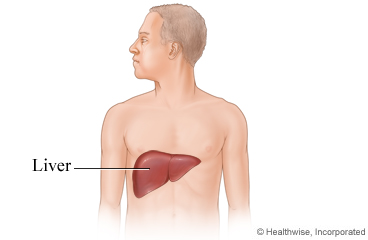
Overview
Hepatitis C is an infection of the liver caused by a virus. This virus spreads when blood or body fluids from an infected person enter another person's body. This can happen when people share needles, razor blades, or toothbrushes. It can also spread through sex.
The virus doesn't always cause symptoms. But you may feel tired. And you may have a headache, sore muscles, nausea, and pain in the upper right belly. Other symptoms include yellowish skin and dark urine. Home treatment can help ease symptoms. And your doctor may prescribe antiviral medicine.
Long-term infection can lead to severe liver damage. So make sure to go to your follow-up appointments.
Follow-up care is a key part of your treatment and safety. Be sure to make and go to all appointments, and call your doctor if you are having problems. It's also a good idea to know your test results and keep a list of the medicines you take.
How can you care for yourself at home?
- Be safe with medicines. If your doctor prescribes antiviral medicine, take it exactly as prescribed. Call your doctor if you think you are having a problem with your medicine.
- Do not drink alcohol. Alcohol can damage the liver. Tell your doctor if you need help to quit. Counseling, support groups, and sometimes medicines can help you stay sober.
- Do not take drugs or herbal medicines. They can make liver problems worse.
- Make sure your doctor knows all of the medicines you take. Some medicines, such as acetaminophen (Tylenol), can make liver problems worse. Do not take any new medicines unless your doctor tells you to. This includes over-the-counter medicines.
- Maintain a healthy lifestyle. Get plenty of exercise if you feel up to it. Eat a healthy diet.
- Drink plenty of fluids. If you have kidney, heart, or liver disease and have to limit fluids, talk with your doctor before you increase the amount of fluids you drink.
- Get the vaccines (if you have not already) to protect yourself from hepatitis A and hepatitis B, influenza, and pneumococcus.
- Keep cool and stay out of the sun. The infection can make you itch. Try to wear cotton clothing. Talk to your doctor about medicines for itching. Follow the instructions on the label.
- If you feel depressed, talk to your doctor about treatment. Many people who have long-term illnesses get depressed. Keep in mind that antiviral medicine can make depression worse.
How can you avoid spreading hepatitis C?
- Tell the people that you live with or have sex with about your illness as soon as you can.
- Don't share needles to inject drugs. Don't share other equipment (such as cotton, spoons, and water) with others. Find out if a needle exchange program is available in your area, and use it. Get into a drug treatment program.
- Practice safer sex. Reduce your number of sex partners if you have more than one. Unless you are in a long-term relationship in which neither partner has sex with anyone else, always use latex condoms when you have sex.
- Don't donate blood or blood products, organs, semen, or eggs (ova).
- Make sure that all equipment is sterilized if you get a tattoo, have your body pierced, or have acupuncture.
- Do not share your personal items. These include razors, toothbrushes, towels, and nail files.
- Tell your doctor, dentist, and anyone else who may come in contact with your blood about your illness.
- Prevent others from coming in contact with your blood and other body fluids. Keep any cuts, scrapes, or blisters covered.
- Wash your hands—and any object that has come in contact with your blood—thoroughly with water and soap.
When should you call for help?
Call 911 anytime you think you may need emergency care. For example, call if:
- You have trouble breathing.
- You vomit blood or what looks like coffee grounds.
Call your doctor now or seek immediate medical care if:
- You feel very sleepy or confused.
- You have a fever.
- There is a new or increasing yellow tint to your skin or the whites of your eyes.
- You have new or worse belly pain.
- You have any abnormal bleeding, such as:
- Nosebleeds.
- Vaginal bleeding that is different (heavier, more frequent, at a different time of the month) than what you are used to.
- Bloody or black stools, or rectal bleeding.
- Bloody or pink urine.
Watch closely for changes in your health, and be sure to contact your doctor if:
- You have any problems.
- Your belly is getting bigger.
- You are gaining weight.
Where can you learn more?
Go to http://www.healthwise.net/patientEd
Enter K781 in the search box to learn more about "Hepatitis C: Care Instructions".
Current as of: April 30, 2024
Author: Ignite Healthwise, LLC Staff
Clinical Review Board
All Healthwise education is reviewed by a team that includes physicians, nurses, advanced practitioners, registered dieticians, and other healthcare professionals.

